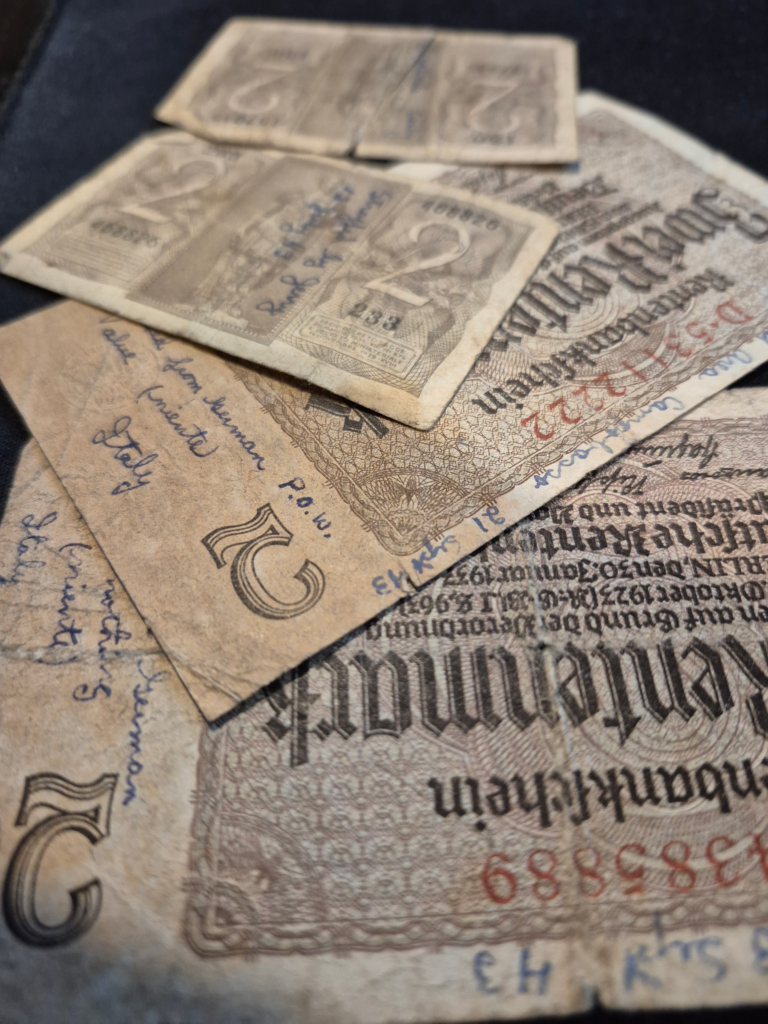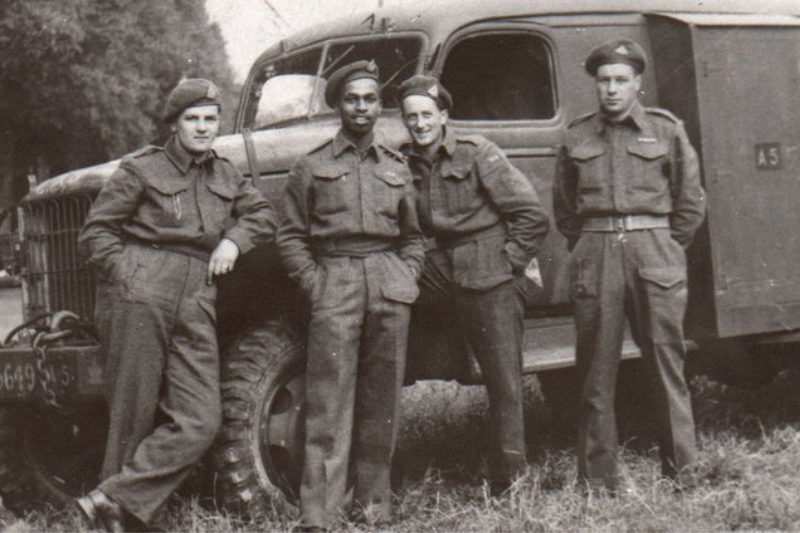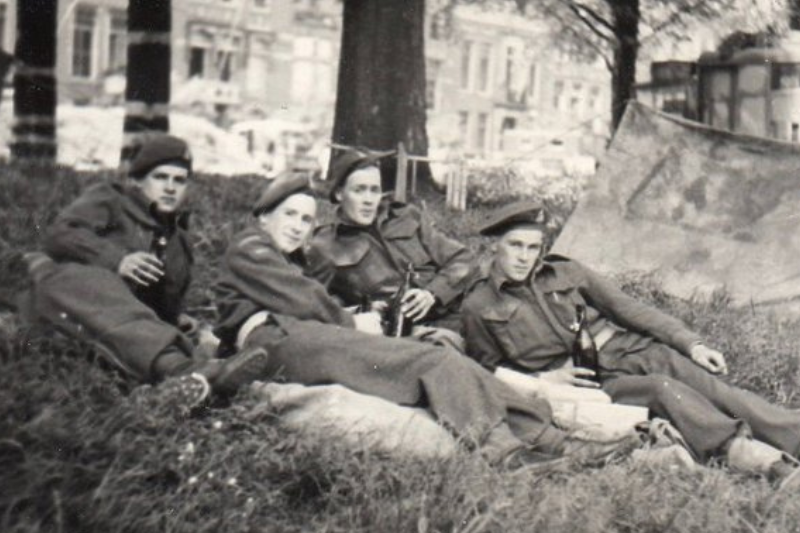There’s a photograph I keep in my desk. It shows a a group of young men in uniform, barely more than boys really, slouched on a hillside holding bottles of beer as they stare into the camera. It was taken somewhere in Holland in the spring of 1945.
On the far left is someone who, if you squint just right, bears a striking resemblance to me. That would be my grandfather, Joseph Walter Hart. And just like every other photo of him from the war, he’s not wearing a helmet. He spent almost his entire tour in Europe without one, because of something that happened just outside of Ortona.
He was shaving one morning, using a truck wheel as a makeshift stand for his helmet. Someone was brewing tea with a jerry-rigged stove nearby. The camouflage netting caught fire. In the scramble that followed, the driver lurched forward and flattened my grandfather’s helmet like a pancake. He spent the rest of the war without proper head protection, a detail he recounted decades later with the kind of bemused detachment that only comes from surviving something that could have killed you a dozen different ways.
I’ve been thinking about that helmet as Remembrance Day approaches — not because of what it represents in the abstract, but because of what it says about the distance between then and now, between sacrifice and comfort, between the generation that fought fascism and those of us who inherited the world they secured.
A lesson in contrasts
My grandfather turned 20 aboard the Queen Elizabeth in 1942, sailing toward England with 23,000 other young Canadians crammed into a ship built for luxury, not war. He came home four years later at 24, having served as a signalman in the Royal Canadian Corps of Signals across England, Italy, and northwestern Europe. The years he spent sleeping in mud and transmitting coded messages in the mountains above the Mediterranean, I spent selecting university courses and debating the merits of various academic theories. It’s a contrast that never quite settles comfortably in my mind.
Like most veterans of his generation, Joe Hart wasn’t one for war stories. My mother and aunt rarely heard him speak of those years. It took the unfiltered curiosity of a child — me, pestering him with questions during weekend visits — to crack open that silence. Even then, his memories arrived wrapped in humour, as if laughter were the only acceptable container for experiences too raw to examine directly.
He told me about fishing in the Italian mountains without gear, using a Thompson submachine gun to create a concussion wave that stunned trout in a stream.
“You didn’t have to hit them,” he’d say, eyes bright with mischief. “Just shoot near them and pick them up.”
He described the first Christmas overseas, spent just outside Ortona, where they managed to scrounge up turkeys and “kind of confiscated them” until they were ready to cook for the troops. The food, he noted, wasn’t always good — lots of dehydrated eggs and corned beef, something called Compo rations that featured a tinned meat-and-vegetable concoction nicknamed “Muck-and-Vomit.”
What happened in Sicily
But between the laughs, darker truths emerged. On his third day in Sicily, his convoy came under air attack. They lost five or six killed, 15 to 20 wounded out of 60 men. “They got the vehicle in front of mine and the one behind it,” he told me during an interview I conducted for a newspaper profile in the late 1990s. “I was just lucky.”
When I asked if there were memories he preferred not to share, he simply nodded and asked me to move on to the next question.
After the First Canadian Division left Italy to prepare for D-Day, my grandfather stayed behind as part of a deception operation, sending fake radio signals to mask troop movements. It was unglamorous work — sitting in farmhouses with wireless equipment, tapping out messages designed to convince German intelligence that Allied forces remained where they’d already departed. No medals came from that assignment. Just the quiet knowledge that the ruse contributed to something larger than any individual role.

A box of belongings
Years after his death in 2006, I found something tucked away in a box of his belongings: Italian lire and German reichsmarks, paper currency so worn and fragile the edges had gone soft as cloth. On a two-lire note, in his unmistakable handwriting, he’d written: “Strafed by Jerry 12 July 43.” On one of the reichsmarks: “Received from German P.O.W. for nothing value. Italy 3 Sept 43.” On the other is scrawled a note about being at a “rest area” in Campobasso, Italy, on Sept. 21, 1943.
Tucked among the bills was a military pass, dated March 21, 1945 — less than two months before the war in Europe would end. The form, printed and official, authorized Signalman J. Hart, service number B111985, to be in Rome “for purpose of duty and billets.” Station: “In the field.” The bureaucratic language couldn’t be more different from the scrawled notes on currency, yet both served as proof of the same thing: he was there, moving through a landscape of destruction, doing work that needed doing.
The bills themselves were worthless — relics of economies that collapsed, regimes that fell, a world that ceased to exist the moment the guns went silent. But he’d kept them anyway, inscribed with the only accounting that mattered: when, where, what happened. July 12, 1943. Under German air attack. Still alive to write it down.
I don’t know what possessed him to pull out that lire note in the aftermath of being strafed and mark the date. I don’t know if he was shaking when he wrote it, or if the adrenaline had already drained away into the peculiar flatness that comes after mortal danger passes. What I do know is that he kept it for 63 years, moving it from posting to posting, home to home, never mentioning it, never displaying it. Just holding onto evidence that he’d been there, that it had happened, that somehow he’d survived to record it.
The contrast between the official pass and the annotated currency reveals something about how we document experience. The military allowed him to go to Rome on March 21, 1945, for duty and billets — a transaction recorded in triplicate, stamped and signed by a captain commanding the base. But the things that mattered enough for him to write down on his own time, in his own hand, were the moments when death brushed close: being strafed, encountering a German prisoner, the strange economies of survival in a combat zone.

Return to Holland
In 1995, he returned to Holland for the 50th anniversary of liberation. The Dutch rolled out poppies and flags on the graves. The gratitude, even half a century later, was overwhelming. At Groesbeek Cemetery, where 2,338 Canadians are buried, he remarked that the Dutch maintained those graves better than most people tended their own lawns.
“If it wasn’t for you people, I wouldn’t be here,” one Dutch woman told him. “I wouldn’t be around or my parents wouldn’t be around.”
Joe Hart was 84 when he died. He’d been married 58 years to his wife Bonnie, raised two daughters, nurtured four grandchildren, and saw the birth of two great-grandchildren. He worked 38 years at the same company after the war, and served three years as president of Royal Canadian Legion Branch 43 in Oshawa. By any standard, he lived a full life. But it was shaped irrevocably by those four years between 20 and 24, when the trajectory of history demanded everything young men had to give.
Today, we talk often about resilience, mental health, and trauma-informed leadership. Those are vital conversations. But on Nov. 11, I’m also reminded that they are a luxury that exist because earlier generations endured conditions that would break most modern workplaces within days. They slept in mud, lost friends, and came home to silence their pain with work because therapy wasn’t an option and vulnerability wasn’t a language anyone spoke.
We owe them more than ceremony. We owe them recognition — that our ability to debate policies, build careers, and live safely was purchased at a cost few can imagine. Not in theory, but in flattened helmets and currency marked with dates when death came close.
On Nov. 11, I’ll think of a young signalman who, after being strafed by German aircraft, wrote one short line on a two-lire note. Brief. Factual. Evidence that he was there.
He never replaced that flattened helmet, it was an odd-size and replacements kept arriving after he’d deployed elsewhere. But he made it home, carrying stories he seldom told.
I tell his story ever year for two reasons.
The first is simple: I’m proud of him.
The second carries more weight.
Near the end of his life, I asked what his greatest fear was. He paused, took a breath, and said this: “That people will forget what we did. That in the generations to come, they won’t remember. And then someone else will have to do this all over again.”





